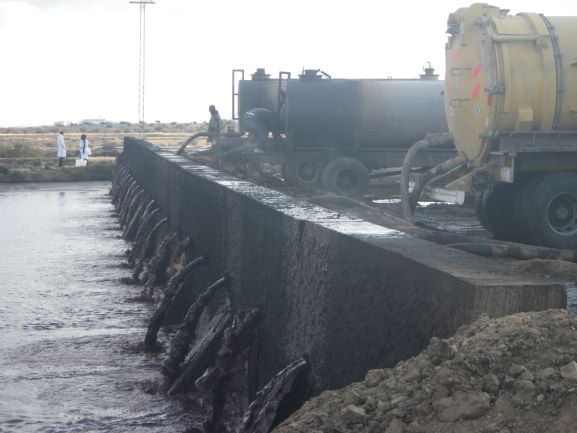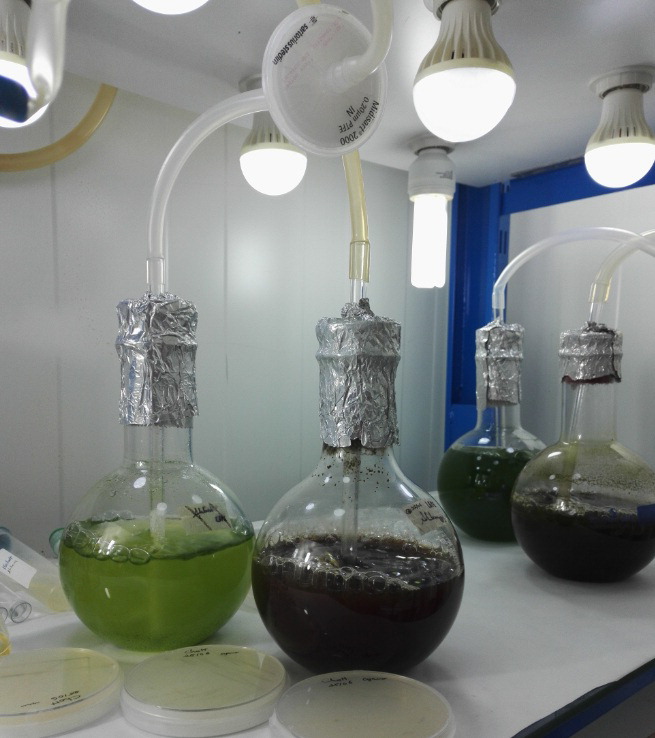 |
| Truck tankers discharging Olive Mill Wastewater in storage and evaporation ponds |
The objective of this project, which ended on December 31, 2022, was the development of an eco-friendly and cost-effective microalgal-based process for olive mill waste (OMW) treatment and recycling for the production of (1) treated and reusable OMW for ferti-irrigation use, contributing to solving water scarcity problems), (2) renewable biomass useful for clean energy production, in particular, biogas, and (3) bio-fertilizers for agriculture use produced from the process by-product, the biochar, and sludge. Dr. Sayadi reports that his team’s findings obtained during the project have facilitated the creation of a cooperative network of Tunisian researchers, international partners, and local NGOs for reducing the agricultural waste impact on the environment and exchanging know-how and market intelligence to develop research capacity. The project results also contributed to the development of a new sustainable concept for olive industry waste management and development of value-added by-products. For example, the production of biogas from the produced micro-algal biomass can be used to generate electricity and heat, as well as biodiesel production, ultimately reducing greenhouse gas emissions. High-added-value molecules (lipids, proteins, carotenoids, chlorophyll, etc.) can be extracted for biofuel, cosmetics, and nutraceutical applications. Sludge and biochar can be used for soil treatments and treated OMW for ferti-irrigation, thus contributing to preserving precious freshwater resources, especially in semi-arid countries like Tunisia.
The research carried out during the project’s five-year term had resulted in four peer-reviewed publications by the time the final report was submitted in late January 2023. There were also valuable capacity building benefits for the 32 members of the project team, 26 of whom were female. These included four undergraduates and one Master’s student who completed their required theses based on their research conducted as part of the project. The two U.S. partners on the project visited Tunisia in July 2019 to offer their guidance, and Tunisian postdoc Dr. Ahlem Jebali was supported to present her work at the IWAlgae conference in Spain in June 2019. PEER funds also provided for a substantial upgrade in the technical infrastructure at the PI’s lab, including a fluorescent microscope, mixer mill, spectrophotometer, peristaltic pump, fume hood, universal light meter, pilot-scale pyrolysis reactor, photometer, and analytical balance.
Even now after the project has ended, Dr. Sayadi reports that his research group will continue working on microalgae cultivation using pre-treated OMW and characterization of microalgae biomass for potential high-value-added molecule recovery and biodiesel production. Their study of anaerobic digestion of algal biomass will be carried out in bioreactors. Under the PEER project, they began with anaerobic digestion of microalgae (
Senedesmus, Chlorella, and
Picocystis) produced on the different pretreated OMW (by ultrafiltration, biochar, and coagulation-flocculation treatments) in batch cultures, and they plan to develop an anaerobic up-flow fixed bed reactor for biogas production. The spent biochar from the pretreatment of OMW, the treated OMW, and the sludge produced from the anaerobic digestion will also be used as soil fertilizers in future planned studies. The development of bio-fertilizers for agricultural use produced from olive processing by-products, biochar, and sludge are still a work in progress. In order to reduce the impact of agricultural waste on the environment, the PI and his team plan to organize an open day to explain the utilization of olive mill by-products and train farmers on better exploiting these products in ferti-irrigation and soil fertilization. The ongoing work will be well supported thanks to grants awarded by the Tunisian National Ministry of Higher Education and Scientific Research and the German Federal Ministry of Education and Research.
PublicationsAmina Maalej, Ines Dahmen-Ben Moussa, Fatma Karray, Mohamed Chamkha, and Sami Sayadi. 2022. Olive oil by-product’s contribution to the recovery of phenolic compounds from microalgal biomass: biochemical characterization, anti-melanogenesis potential, and neuroprotective effect.
Biomass Conv. Bioref. https://doi.org/10.1007/s13399-022-02640-9Raida Karray, Wiem Elloumi, Rihab Ben Ali, Slim Loukil, Mohamed Chamkha, Fatma Karray, and Sami Sayadi. 2022. A novel bioprocess combining anaerobic co-digestion followed by ultra-filtration and microalgae culture for optimal olive mill wastewater treatment.
Journal of Environmental Management 303 (2022) 114188.
https://doi.org/10.1016/j.jenvman.2021.114188Ines Dahmen-Ben Moussa, Mohamed Ali Masmoudi, Sirine Choura, et al. 2021. Extraction optimization using response surface methodology and evaluation of the antioxidant and antimicrobial potential of polyphenols in
Scenedesmus sp. and
Chlorella sp..
Biomass Conv. Bioref.
https://doi.org/10.1007/s13399-021-01850-xInes Dahmen-Ben Moussa, Amina Maalej, Mohamed Ali Masmoudi, Firas Feki, Sirine Choura, Nidhal Baccar, Lobna Jelail, Fatma Karray, Mohamed Chamkha, and Sami Sayadi. 2021. Effect of olive mill wastewaters on
Scenedesmus sp. growth, metabolism and polyphenols removal.
Journal of the Science of Food and Agriculture.
https://doi.org/10.1002/jsfa.11200.





